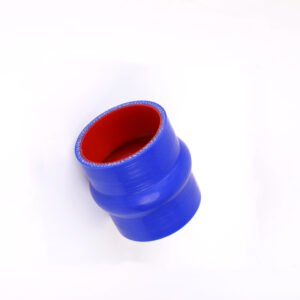Custom rubber hoses in aerospace applications are meticulously designed and manufactured to meet the stringent requirements of this industry, considering factors such as safety, reliability, and performance.
Here are several ways in which custom rubber hoses are tailored for aerospace applications:
- Material Selection: Aerospace-grade rubber hoses are typically made from specially formulated materials that meet or exceed strict industry standards. These materials are chosen for their resistance to extreme temperatures, pressure differentials, and compatibility with aviation fuels and hydraulic fluids.
- Temperature Resistance: Aerospace environments can experience a wide range of temperatures, from extreme cold at high altitudes to high temperatures near engines. Custom rubber hoses are designed to withstand these temperature variations without compromising their structural integrity or flexibility.
- Pressure Ratings: Aerospace hydraulic and pneumatic systems operate under high pressure. Custom rubber hoses are engineered to meet specific pressure ratings required for different applications within the aircraft, ensuring reliable performance and safety.
- Flexibility and Durability: Custom rubber hoses are designed to be flexible yet durable to accommodate the dynamic movements and vibrations experienced in flight. The hoses must be resilient to repeated flexing and bending without developing cracks or leaks.
- Weight Considerations: Weight is a critical factor in aerospace design. Custom rubber hoses are optimized for lightweight construction without sacrificing strength or performance, contributing to overall fuel efficiency and aircraft weight management.
- Fluid Compatibility: Aerospace applications involve a variety of fluids, including aviation fuels, hydraulic fluids, and lubricants. Custom rubber hoses are formulated to be compatible with these fluids to prevent degradation, corrosion, or contamination.
- Electromagnetic Compatibility (EMC): Aerospace systems require components that do not interfere with or are not susceptible to electromagnetic interference. Custom rubber hoses may incorporate features to enhance EMC performance, ensuring the reliability of electronic systems on the aircraft.
- Vibration Dampening: Aircraft engines and systems generate vibrations during operation. Custom rubber hoses are designed with features to dampen vibrations, reducing the transmission of shocks and ensuring the longevity of the hoses and connected components.
- Fire Resistance: Custom rubber hoses in aerospace applications often have fire-resistant properties to meet safety standards. Fire-resistant materials and design features help prevent or mitigate the spread of flames in case of an emergency.
- Quality Standards Compliance: Custom rubber hoses for aerospace applications must adhere to strict quality and safety standards set by aviation authorities. Manufacturers follow rigorous testing and certification processes to ensure that the hoses meet or exceed these standards.
In summary, custom rubber hoses in aerospace applications are tailored through careful material selection, design optimization, and adherence to stringent industry standards. Their performance characteristics are fine-tuned to withstand the challenging conditions of flight, contributing to the safety, reliability, and efficiency of aerospace systems.
How are custom rubber hoses utilized in the food and beverage sector?
Custom rubber hoses play vital roles in the food and beverage sector, where hygiene, safety, and compliance with stringent regulations are paramount.
Here’s how these hoses are utilized in various applications within the industry:
- Liquid Transfer: Custom rubber hoses are used to transfer liquids within food and beverage processing plants. They are designed to handle various types of beverages, sauces, oils, and other liquid food products without compromising the quality or safety of the materials being conveyed.
- Dairy Processing: In dairy industries, custom rubber hoses are employed for the transfer of milk, cream, and other dairy products. custom rubber hoses They are designed to be resistant to milk fats, cleaning chemicals, and other substances commonly found in dairy processing environments.
- Brewing and Beverage Production: Custom rubber hoses are crucial in the brewing and beverage industry for transferring liquids like water, wort, beer, and other beverages. These hoses are designed to be non-toxic and resistant to flavors and odors, ensuring the integrity of the final product.
- Winery Applications: In winemaking, custom rubber hoses are used for the transfer of wine between different stages of production. They must be compatible with wine and resistant to the chemicals used in the winemaking process.
- Food Grade Hose Assemblies: Custom rubber hoses are assembled into hose systems that comply with food-grade standards. These assemblies are suitable for various food and beverage applications, including those requiring specific levels of flexibility, durability, and cleanliness.
- Conveyance of Edible Oils: Custom rubber hoses are designed to safely transport edible oils, cooking oils, and fats in food processing applications. These hoses are formulated to resist degradation from oils and fats, ensuring the quality of the transported materials.
- Filling and Packaging Lines: Custom rubber hoses are used in filling and packaging lines to convey liquids from processing units to containers. They are designed for smooth handling, preventing contamination, and meeting the hygiene requirements of the food packaging process.
- Chocolate and Confectionery Production: Custom rubber hoses play a role in the production of chocolate and confectionery items by facilitating the transfer of liquid chocolate, syrup, and other ingredients. They are designed to handle the specific challenges of confectionery processing.
- Cleaning Processes: Custom rubber hoses are used in the cleaning processes of food and beverage production equipment. They resist the harsh chemicals used in cleaning while ensuring thorough sanitation to meet regulatory standards.
- Compliance with FDA and USDA Regulations: Custom rubber hoses in the food and beverage sector are formulated to meet the strict regulations set by the U.S. Food and Drug Administration (FDA) and the U.S. Department of Agriculture (USDA) for materials intended for contact with food.
In summary, custom rubber hoses in the food and beverage sector are designed to address specific requirements of cleanliness, safety, and material compatibility. They contribute to the efficient and hygienic processing of food and beverages while ensuring compliance with industry regulations.
